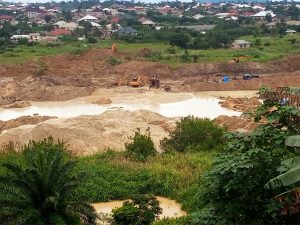Illegal mining—commonly known as galamsey—continues to thrive in Ghana because political elites are deeply entangled in the capture of mineral resources. The public outrage is not merely about environmental degradation; it is about the partisan seizure of Ghana’s gold fields. How else can a small group of morally bankrupt actors jeopardize the lives of millions—rich and poor alike—without facing legal consequences?
After years of condemning galamsey while in opposition, now President Mahama has dangerously institutionalized it by establishing a GOLDBOD that purchases gold from illicit sources. This move not only legitimizes illegal mining but also rewrites the rules to benefit partisan interests. It is a textbook case of political projection—accusing opponents of the very tactics one has mastered.

But galamsey is not just a political scandal; it is a symptom of a deeper structural injustice. Before colonial rule, Ghanaian customary law did not separate land rights from mineral rights. Communities understood minerals as part of their natural inheritance. Colonial authorities dismantled this framework, appropriating mineral wealth through force and legal manipulation. Today, that legacy persists—not through foreign guns, but through domestic complicity.
The persistence of galamsey reflects the failure of our political class—dishonest, self-serving, and indifferent to the public good. Academics and legal professionals, too, have become beneficiaries of colonial-era laws that strip communities of their rightful claims. The inability to end illegal mining is not a technical problem; it is a deliberate abuse of power. What we witness is not policy failure, but elite capture—where rhetoric masks the ruling class’s intent to monopolize wealth at the expense of Ghanaian landowners.
The ease with which illegal mining is organized and executed reveals a profound lack of political will, a breakdown in law enforcement, and a compromised judiciary. A nation that cannot summon the moral courage to prosecute those who destroy its forests and poison its rivers is a nation in peril.
Our politicians, while in opposition, often present their own selfish desires as the national interest. When they get into power, no one stops the corrupt political thug with a party card. No one holds them to account. The police shrug, because most often it is better to look the other way for a cut from illegal, unearned income than to make a noise. An out-of-court justice prevails, delivering only one sentence: get rich quick. All this against an extremely high but chilling backdrop – corruption.
A strong democracy and a strong economy are based on the foundation of the rule of law, property rights of the individual, and a quick execution of justice by the courts – no ifs and buts, no exception, and definitely no party cards.
Imposing law and order means harshness. It requires that corrupt and actual financiers be treated with the swift, sudden, and relentless force that today only people who are cursed at fetish shrines receive. We know that law enforcement agents know how to crack the whip. It is just that the crackdown is normally reserved for petty criminals and political enemies.
This country and society must learn how to say “No”. No to illegal appropriation of private lands. No to the ongoing colonial land policies. No to political chaos. It’s not difficult. Those financiers and politicians who support illegal mining should be in jail, not in government, because the shrewd argument that the government represents “we,” “us,” “our” masks the actions of the political caste, its enforcers, and its net beneficiaries, not the individual.
Moreover, this language often subtly justifies the actions of the state, whether in the past, present, or future. The claim that natural resources belong to the state, which should distribute wealth fairly, is dishonest. It’s a tactic used by our leaders to funnel the people’s wealth to the political elite and their allies, while the true landowners endure poverty.
For the sake of our health and political stability, the Mahama administration must now be held accountable to ensure that wealth benefits the people, not just political elites and cronies. We will inevitably have to make that choice. The poor, who are crying out against galamsey, can only be pushed so far before they either push back themselves or rally behind someone who will be ruthless. There will definitely be a backlash.
The question is what kind of backlash might occur. To prevent illegal miners who have guns from enforcing control, there needs to be a deliberate and conscious enforcement of the law where Ghanaian society says, “Enough is enough.”
The current justice system and structures can and should be used to re-interpret the legal definition of land and punish stealing gold and destroying the environment without political interference. Above all, instead of state ownership, mineral rights should be shared between the government, individuals, and local populations through direct sharing of royalties.
If this does not happen, a small case of looting could easily spiral out of control into chaos. That is when our society might start falling apart.
By Kwadwo Afari









